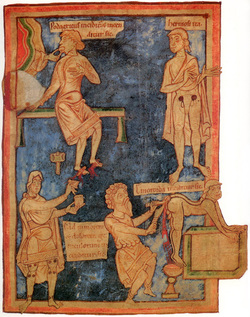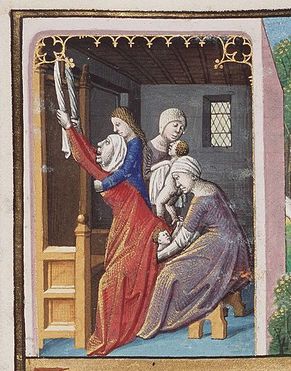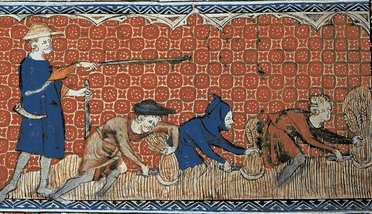 treatment of Hemorrhoids / image bottom right treatment of Hemorrhoids / image bottom right On 2nd November 2013 I wrote a post for this blog entitled “Three reasons Why You Shouldn’t Travel Back in Time.” And maybe I should have called this post “Another Three Reasons Why Time Travel Isn’t a Good Idea.” I don’t know why I’m fixated on this subject perhaps because Outlander is airing here in Canada. For those of you who don’t know the storyline (Although I can’t believe there’s someone out there who hasn’t heard of it.) It’s about a woman who accidently travels back in time to the eighteenth century Scottish Highlands. Now, I have to admit I don’t know much about Scotland in the time period of Diana Gabaldon’s fabulous novel, but I do study the middle ages and trust me you don’t want to go there. Anyway without further ado I will list another three reason why you shouldn’t travel back in time to the middle ages. Medical Practices To be honest, I don’t know that medieval healers were as ignorant as the movies would have us believe. I do think that people had a basic understanding of cleanliness. Everyone washed their hands before eating, and many towns had communal bathhouses, although these weren’t places a respectable woman would frequent, it does indicate that bathing was more common than we’ve been led to believe. And there is evidence that some patients did undergo primitive forms of surgery such as: trepanning (Cutting a hole in the patients skull to relieve inflammation) This is a procedure that actually has scientific relevance but without modern equipment, reliable anesthetics and antibiotics there can’t have been a very good chance of survival and you would think it would be a last resort but there are cases where it was used to treat epilepsy, migraines, and depression. The problem is that even though medieval physicians wanted to heal the sick they lacked a basic understanding of how diseases were spread and had little or no understanding of how the human body worked. It wasn’t unusual for a physician to examine, smell and taste the patient’s urine. (Yes, taste urgh!) This is an era where a common cure for hemorrhoids was a hot poker to the affected area. Talk about cures that kill.  Medieval Childbirth Medieval Childbirth Childbirth There are estimates that put mortality rates for medieval women and children as a result of childbirth as high as 20%. But I don’t see how these figures could be accurate as surviving medieval records are spotty at best. There is a paper by the Journal of the Royal Society of Medicine that shows the mortality rates for mothers in 19th century until the early 20th century somewhere between 1% and 6%. This is an age where trained physicians attended births, and there was a greater understanding of medicine as we see it today, and still 6% of women died. As far as I can ascertain in the middle-ages doctors rarely attended births. The midwife would rub the mother’s stomach and genitalia with oil and bloodletting at the ankle was a common treatment to hasten delivery. (And you’d hope she used a clean knife) Contrary to what you might believe during the medieval period a midwife was generally considered a respectable member of the community. Her word was respected in the courts and because so many mothers and children died in childbirth she was able to deliver last rites. But still how many women would want to go back to a time where childbirth was lethal and even if the mother survived there was a good chance her child would die before his fifth birthday. As a mother myself that idea upsets me.  Medieval Peasants Medieval Peasants Peasants As I said in my last post most of you would have been peasants or villains, at least ninety percent of the population worked the land and paid their lord for the privilege in either work or service. Their daily life was grim and shaped by backbreaking labour, hunger, and mistreatment. Their living conditions improved after the Black Death (I’ll be going into this in more detail in next week’s post.) But for the majority of the medieval period they carried the burden of working the land and providing food not just for themselves but for the nobility too. Although, not all peasants were created equal some were freemen, they didn’t have to ask their lord permission to marry, travel, and most importantly they had the right to bear arms. Whereas, the unfree had to stay and work their lords land. They could be put in chains to prevent them from running away and his lord had the right to exercise corporal punishment over him. This last point is pretty scary when you consider the fact that most lords were murderous thugs who thought nothing of murdering innocent women and children. There you have it another three reasons we should be thankful that Outlander is a work of fiction.
Sandra Dailey
9/7/2014 04:52:07 am
I don't watch much television, but I've seen Outlander mentioned on Facebook lately. Yes, I guess I'm one of the few who've never seen it. I agree, I wouldn't want to time travel to those days, though. I'm much too spoiled.
Marlow
9/7/2014 09:51:47 am
Me too Sandra. I'm always shocked when love triumphs over indoor plumbing. 9/7/2014 07:26:44 am
You are so right about medical practices and childbirth in the middle ages being pretty scary. And a big thing is that they didn't have antibiotics. I read once that even if you cured cancer and heart disease, it wouldn't save as many lives as antibiotics have. That's because they start saving lives at birth. Now, instead of half of our chldren dying, it's pretty uncommon for people to lose a child to disease. And part of the reason cancer and heart disease are such killers now is that so many of us have survived infections that would have killed us even a hundred years ago and now live to middle age when cancer and heart disease begin to take a toll.Very thought provoking, interesting post.
Marlow
9/7/2014 10:08:01 am
I always love reading your comments, Mary, talk about thought provoking. I agree. I'm always surprised when people talk about the rise in diseases like Alzheimers. I’m sure there are environmental factors involved, but let’s face it; most of our ancestors didn’t live long enough to find out. They've made some amazing breakthroughs in the medical field in the last century and I hope they have many more in the century to come.
I love your history blogs, Marlow. Fascinating. As an ex-nurse, I can agree you can tell a lot by looking at and sniffing urine. (Never tasted it and never wanted to!)
Marlow
9/7/2014 10:38:33 pm
Diana. I always enjoy your knowledge and insight. Thank you for sharing. 9/7/2014 10:38:36 pm
My thought/concern is the smell. As handsome as Jamie is, how often do you think his shirt gets washed or changed? My husband is always teasing me about my sensitive nose...I'll walk around sniffing the air "do you guys smell that?" Maybe if you grow up with it, fine. But I think if I were suddenly to time travel, the smells would take a lot of getting used to.
Marlow
9/7/2014 10:45:36 pm
Oh yes, the smells. They would be pretty bad wouldn't they. But as you said, if you were born into it you wouldn't notice. Everytime I'm around farm animals; horses, cows or sheep, I have to cover my nose because I'm a town girl. I'm amazed Clair doesn't walk around with her hand permanently over her nose. 9/8/2014 09:38:16 am
Yes, the medieval times can be rough at best. People just didn't have proper nutrition or medical care and all labor was very tough, so their life span was definitely truncated.
Marlow
9/8/2014 12:12:10 pm
I agree Hebby. Thanks so much. Comments are closed.
|
|